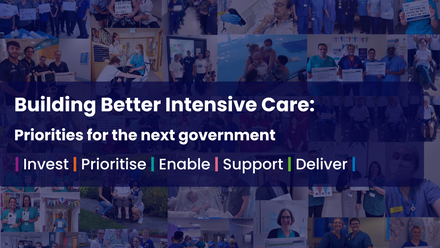Back in the beginning of 2020, the Intensive Care Society (ICS) commissioned a piece of strategic policy work to horizon scan and co-develop a document to help professionals and policy makers to plan for the next 10 years. The pandemic emphasised the importance and timing of this programme work.
Developing the Intensive Care 2020 and Beyond: Co-developing the future workstream has been essential to understanding the landscape of intensive care and identify the areas that need to be improved, those we need to build on and carry on doing well and the areas where there are gaps in our knowledge. This will help us to provide even better care for patients.
Led by ICS Council Member and intensive care clinical academic, Dr Charlotte Summers, we convened a cross-sector group of 54 representatives from over 20 organisations that comprise the intensive care community, including Royal Colleges, Specialist Societies, ICNARC, NHS England and the National Institute for Health Research (NIHR). Together, we undertook a wide-ranging review of the future of intensive care, focussed around six of the fundamental questions [in the document]. Alongside this we conducted a nationwide survey to seek views from intensive care professionals and patients/care-givers regarding the future of our speciality.
Dr Charlotte Summers said “I was honoured to Chair this important work that sets out a renewed vision for the future of intensive care. The successful creation of this vision is testament to the engagement of a large number of individuals from more than 20 organisations as well as the wider intensive care community. I am extremely grateful to all who took the time to share their thoughts during the process. Our collective hope is that this report will serve as a roadmap for policy-makers, clinicians and commissioners as we look to move beyond the pandemic”
The ‘Intensive Care 2020 and Beyond: Co-developing the future’ policy presents the findings from our extensive engagement across the intensive care community, with findings presented under each ‘big question’. We have aimed to highlight what are considered by the intensive care community to be the most pressing and unanswered questions – the priorities that need to be addressed through future data collection, analysis, and research within intensive care and beyond as we move towards the future.
Dr Ganesh Suntharalingam said I am delighted to see this important and work come to fruition – it takes the multiple collaborations, shared insights and learning and rapid communications arising during the pandemic, and uses them to great benefit in addressing fundamental questions about what critical care is and how it can develop in the decade to come to benefit patients and their families throughout the trajectory of their illness and return to health. I would like to congratulate Charlotte, the project team, and every contributor on the professional diversity and engagement of the process, and the scope and vision of the end result.”
It brings out the broader role of impact of critical care in the wider hospital - so vividly illustrated in 2020 - and identifies important research themes of survivorship and long term impact that emphasise that a stay in the intensive care unit is just the first step in the patient’s recovery and in their ongoing life
Dr Stephen Webb said “While continuing to support the intensive care community throughout 2020 during the coronavirus pandemic we have also been setting our sights on the next 10 years. As the leading intensive care membership organisation and charity in the UK we are delighted to present our vision for the future of intensive care. Having spoken to hundreds of our members, this is a vision in which staff are supported and trained, high quality research is delivered and most importantly patients are cared for compassionately. It is essential that we drive home this message and continue to do so over the next few months.”
We urge policymakers, commissioners and research funders to heed this co-developed vision for the future of intensive care medicine in the UK and ensure that it is realised.



